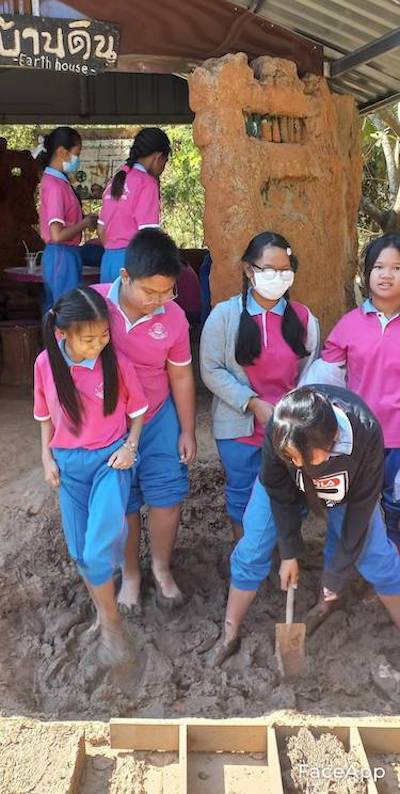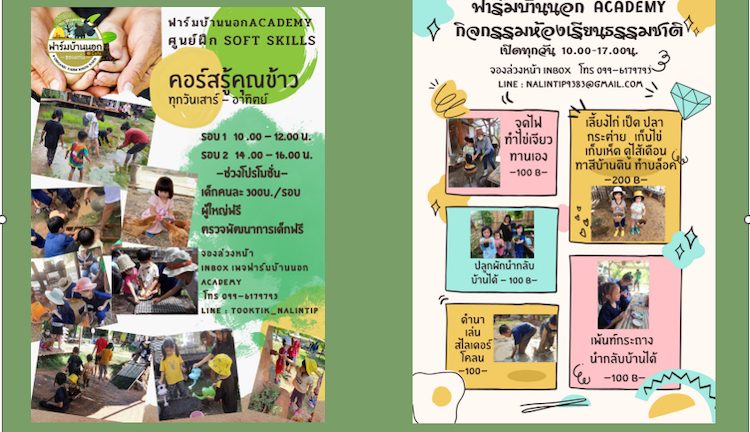By Pattama Vilailert
KHON KAEN, Thailand | 6 January 2024 (IDN) — Nalinthip has been a nurse for 13 years and is the mother to two children aged three and five. Her husband is a YouTuber who spends most of his time on the screen at the age of 40. His Internet using behavior alarmed Nalinthip and she became worried that her young children would follow in the father’s footsteps.
She wanted to take her children away from the mobile phone. She was well aware that phone-addicted children develop slowly and cannot concentrate or pay attention for a long time.
“I took my kids outdoors to plant vegetables, feed chickens, and play outdoors in the sand and mud, jump in the water, and run around in the garden.” Initially, she intended to shift her children’s attention from mobile phones to nature. Still, later in 2017, she translated her attempt by setting up Farm Baannoak Academy, a social enterprise business.
The farm is just 20 minutes from northeastern Thailand’s Khon Kaen International Airport. It is an organic farm that teaches children sustainable development and essential life skills.
In 2023, global screen time statistics were 6 hours and 58 minutes per day, an increase of almost 50 minutes since 2013. Cross River Therapy, a US-based organization that provides therapy services to children, stated that half of the children between the ages of 0 and 2 interact with smartphones. At the same time, Demandsage, an India-based business data provider, found that Thais spend 5 hours and 28 minutes on their smartphones daily.
Internet usage and occupation
IDN looked at the correlation between Internet usage and occupation of Thais in 2022 and found that government employees spent 11.7 hours on the Internet per day, followed by students with 8.57 hours and freelancers with 7.40 hours1.
“Six years ago, I brought my kids here to help me fill up the land; I bought this 0.79-acre plot for them to run around. The kids reminded me of my childhood when I exercised in a rice field, so I wanted them to live the country life in the urban area”, Nalinthip told IDN. “I uploaded all activities on social media and drew people’s attention to my farm, and eventually, Farm Baannoak Academy commenced.”
She resigned from her nursing job to dedicate her time to promoting the good development of children and a sufficient economy. The sufficiency economy is a philosophy developed by the late King Bhumibol Adulyadej of Thailand to create a balance and stable development at all levels2.
Today, the concept of a sufficient economy is taught in primary schools in Thailand. ”… We teach sufficiency economy theory in the class; our school is located right in Khon Kaen town with limited area, so we don’t have enough space to teach children all about Thai agriculture and farming in line with the sufficiency economy philosophy”, Reuthaithep Boonritraksa, a teacher at a primary school in Khon Kaen told IDN. “So, we bring our pupils to Farm Baannaok Academy to experience the farming lifestyle, the backbone of our country.”
 On the farm, there are fourteen stations, and each station functions as a natural classroom, and students or visitors can learn new life skills, which can be applied in their homes.
On the farm, there are fourteen stations, and each station functions as a natural classroom, and students or visitors can learn new life skills, which can be applied in their homes.
Station 1. Collecting chicken eggs, duck eggs, including feeding chickens, ducks, fish, rabbits, and rats
Station 2. Organic vegetable growing for photosynthetic microorganisms
Station 3. Compost making, vermicomposter, see the recycled water bottle house
Station 4. Automatic watering for vegetable plots controlled via mobile phone
Station 5. Clay house making and painting
Station 6. Learning about rice, ploughing fields, sowing rice, making rice fields, planting rice fields, harvesting rice, milling rice
Station 7. Mud slider, sand play, climbing
Station 8. Making charcoal-fired pizza, papaya salad, omelets, fried rice, ice cream
Station 9. CPR and first aid training and herbs learning
Station 10. Making indigo tie-dye fabric Dye with natural dyes to make spider webs flag
Station 11. Making art, painting pots, painting environmentally friendly cloth bags, moulding clay
Station 12. Workshop for making herbal soap, making aromatic mosquito repellent spray
Station 13. All about Mulberry: making juice, smoothies, jam, and wine.
Station 14. Meditation and yoga teaching, improving children’s personality leadership
Pichai Yodchim, a fifth grade student who attended the farm activity told IDN, “I enjoy the day out here, it is the first time I learned how to make a mud house and got to play in the dirt, it is so fun and better than learning in the classroom. I want to come here again. My friend Somsak also knows that earthworms can improve soil drainage; it amazes him.”
“This is the third time that we bring students here; the farm showcases traditional Thai farming, and students enjoy all stations that let them learn new things and play with friends freely,” says their teacher, Reuthaithep. “Today, 75 students are with us, and I am glad they are truly happy. I think the farm fits our aim to plant the seed of life skills for them to pursue.”
Her aim is in line with Nalinthip’s goal: “Children of this generation were born with social media sphere, they hardly experience living in nature so they tend to be aggressive, we must teach them to harmonize their technology skill with nature and conserve the environment,” she told IDN, adding, “what I am doing now is to plant soft human skills in them since their childhood so they will become quality Thai citizens.”
Since the farm started operations in 2017, it has received over 15,000 visitors participating in all activities, and collecting chicken eggs at station 1 is the most popular activity. All activities in each station are designed to help tailor children’s behaviour in line with their age.
Children ages 3-5 like to play with a mud slider, while 7–11-year-olds want to explore cooking with a wood fire stove.
The farm offers different kinds of programs: a weekend course, a 5-day course, and study tours for government agencies that want to educate staff on the sufficiency economy. Most activities cost between 300 and 100 Bhat (USD 9-3) per kid.
Nalinthip always evaluates whether hands-on farm activities could take children away from the screen long term. “If the children attended a 5-day course, a combination of each station, they would learn about queuing in line, not bullying friends, and sharing”, she argues. “In the course, they set rules by and for themselves. Later, when they returned home, their parents told me they were more polite and helped with the house chores.”
Nevertheless, to take children away from the screen and change their behaviour, parents must change their behaviour to set an example for their children. “The children see their parents playing on their phones and have fun, so they want to have fun and explore what is on the screen that entertains their parents. After all, the children want to play with their parents, but their parents are too busy on the screen,” notes Nalinthip.
“Changing children’s behaviour relies on the effort of parents. Farm Baannoak only encourages them to adjust their children’s behaviour further,” emphasized Nalinthip. [IDN-InDepthNews]
Related links:
1. ETDA, Thailand Internet User Behavior 2022
https://www.etda.or.th/getattachment/78750426-4a58-4c36-85d3-d1c11c3db1f3/IUB-65-Final.pdf.aspx
2. Philosophy of Sufficiency Economy
https://thaiembassy.se/en/monarchy/philosophy-of-sufficiency-economy/
Photo-1: Farm Baan Noak Programs
Photo-2: Children build an earth house
This article was produced as a part of the joint media project between The Non-profit International Press Syndicate Group and Soka Gakkai International in Consultative Status with ECOSOC on 6 January 2024.
IDN is the flagship agency of the Non-profit International Press Syndicate.


